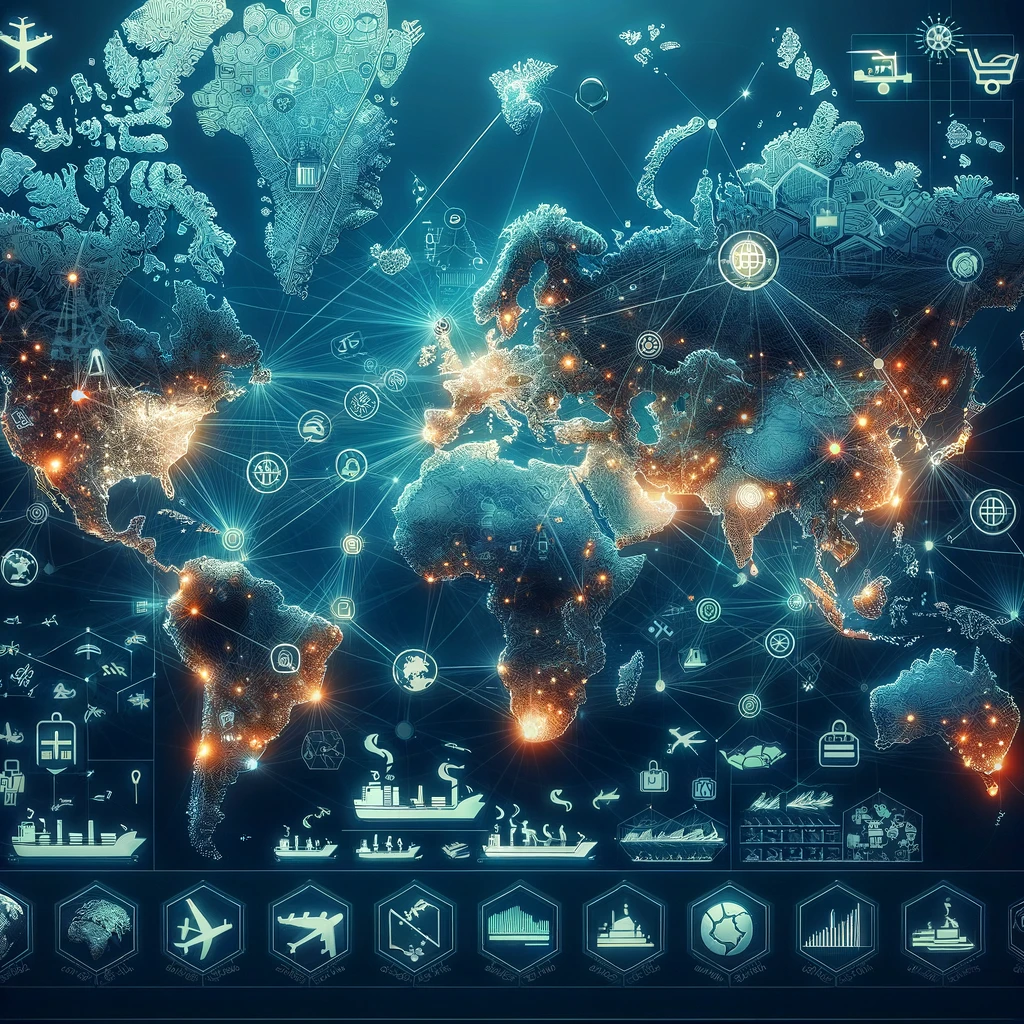Is the de-globalisation of retail inevitable?
Between the climate crisis and geopolitical tensions, globalised trade is becoming fragmented. While the bipolarisation of the world and global warming are imposing new rules, are we going to see a relentless dismantling of international trade?
According to Where is the World Going in 2023 and Beyond? CEO and Investor Outlook Survey carried out by Teneo, an international group specialised in executive consulting, most companies believe that deglobalisation has begun, and that it is a reality that needs to be urgently addressed. To drive home the point, the 2023 edition of the WTO’s World Trade Report points out that “the first signs of trade fragmentation are appearing and threaten to slow growth and development.”
A figure that shows how dynamics are changing, the global trade growth rate was only 0.8% in 2023, down from 3.5% in 2022, and although the WTO forecasts that it will rise to 3.3% in 2024, this is still a long way from the historical average of 4.9%. After a spectacular increase of 4,300% between 1950 and 2021, and with a value currently 350 times higher than in the post-war period, the time has come to slow down. This slowing down obviously applies to France, whose GDP growth is expected to be 0.8% in 2024, with its share of world exports falling to 2.7% in 2023, considerably lower than the 3.5% for the year 2010.
The subprime crisis in 2008, followed by the COVID-19 pandemic in 2020, and finally the war in Ukraine two years later, have profoundly destabilised the economy, triggering an unprecedented rise in the price of raw materials, commodities and energy, generating inflation and slowing international trade.
These three factors, combined with global warming, have highlighted the need to reconsider the flow of goods and services, whose vulnerability to crises has now become obvious. Indirectly, this means that the way in which companies have been operating for several decades, with production sites spread across the globe and supply chains stretching tens of thousands of kilometres from factories to points of sale, is being called into question, which in turn is a threat to globalisation. So, what can we expect? How will international trade evolve?
New world order.
Xi Jinping and Vladimir Putin know each other very well, and have known one another for a long time. By invading Ukraine in February 2022, the Russian autocrat took the initiative of laying the foundation stone for a plan that had been worked out with his Chinese ally over a long period of time: a shift towards a multipolar world, fairer for the losers of the Cold War and fairer for the countries in the South. Only a few days after the conflict broke out, the IMF was concerned about the consequences it could have: “The war has increased the risk of a more lasting fragmentation of the global economy into geopolitical blocs based on separate technological standards, reserve currencies and international payment systems. Such a tectonic shift would lead to long-term loss of efficiency, increased volatility and serious challenges to the rules-based framework that has governed international and economic relationships for the past 75 years.”
In fact, this is exactly what happened. In response, the West excluded Russia from the Swift (Society for Worldwide Interbank Financial Telecommunication) platform, which handles payments for more than 11,000 banks in 200 countries. As many companies left the pseudo democracy led by Vladimir Putin, a fault line appeared in the international financial system, and more widely in global trade, which was fuelled by other conflicts, notably in Taiwan and the Middle East.
This explosive and volatile situation, which in itself constitutes a form of de-globalisation as it gives rise, just like during the Cold War, to two competing blocs, has since posed a growing risk to supply chain operation. It also greatly increases the competition for access to essential resources and critical minerals. Whereas until now, the priority for businesses was to relocate to countries offering the lowest production costs, today it is a question of securing the flow of goods and capital, by anticipating tensions between powers that could degenerate into economic sanctions or supply disruptions.
For retailers, this means they can no longer operate in as open a world as before. This also means that they must become more sovereign and resilient by shrinking their value chains and reducing the geographical spread of their suppliers at a time when geopolitical tensions pose a lasting threat to their businesses. But this is not the only threat they are facing.
The climate factor.
In another blow to the edifice of global trade, rising temperatures, water shortages and extreme weather phenomena are having an increasingly severe impact on the production of manufactured goods and the flow of these goods. While 90% of world trade depends on river transport for deliveries, traffic on main waterways is declining, if not rising sharply from time to time. Between drought and floods, supply disruptions are becoming more frequent and could cost the Euro zone €920 billion in GDP, according to Accenture. A colossal sum.
In France, the Ministry of Ecological Transition has indicated that river levels could fall by 70% in summer in some regions as early as 2024, and according to a World Resources Institute report published in 2023, an unprecedented water crisis is already affecting nearly four billion people globally.
As global warming is set to become more intense, this phenomenon of shortages will require value chains to be drastically shortened, in order to limit companies’ exposure to the risk of breakdown. This obviously applies to retailers.
At the other end of the spectrum, they are now obliged to drastically reduce their CO2 emissions, which again encourages them to de-globalise their operations. In a world that is getting hotter and hotter, it is less and less conceivable that a product should travel tens of thousands of miles to reach the consumer. So everything has to change, especially since CSR efforts alone are not enough, as Mathilde Dupré, Co-Director of the Institut Veblen, explains: “The issue of trade still appears to be a major unanswered question in ecological policies. For example, the EU’s Green Deal aims to reduce domestic greenhouse gas emissions. But this makes no sense without taking into account imported emissions, imported deforestation, or, quite simply, Europe’s environmental footprint. Trade policy plays an important role here.”
In fact, if we are to take on the two major challenges of economic sovereignty and ecological transition, bringing production sites back to local areas – a phenomenon that is currently underway and is driven by a strong political will in wealthy countries – ticks all the resilience boxes. Industrial relocation reduces the risk of supply chains breaking down by cutting the length and complexity of supply chains, drastically cuts down CO2 emissions and even generates jobs locally. However, this shortening runs counter to the dynamics that have enabled individuals and organisations to interconnect across the four corners of the globe, and could deliver a fatal blow to globalisation.
Everything seems to indicate that the globalisation dynamic in place since the 20th century is in the process of being reversed. At least on the surface, as the situation is a lot more complicated than that.
Reglobalisation.
In reality, it is impossible to go back to the way things were before, when states were inward-looking, operating with virtually self-sustaining financial systems, content with a low volume of trade between themselves, in a closed and compartmentalised world, without damaging growth and irreparably undermine economic development on a large scale. De-globalisation is in nobody’s interest, not even those who praise its merits. In this respect, it is unlikely that nationalised reflexes, currently fuelled by the growing antagonism between the West and the rest of the world, will accelerate deglobalisation. The current card reshuffling seems more likely to favour re-globalisation. In other words, a fairer distribution of commercial traffic and more inclusive and equitable economic integration. As Isabelle Méjean, Economist and Professor at Ecole Polytechnique, explains: “Protectionism will be costly for the countries that protect themselves, because prices will rise, impacting purchasing power. But it will also be costly for countries excluded from globalisation. The fragmentation of international value chains greatly benefits emerging countries: it is easier to insert oneself into a value chain than to insert oneself into traditional trade with comparative advantages. “
Rather than seeking to put an end to it, it’s time to reinvent globalisation in the wake of the challenges of our time: protecting the environment, easing political tensions, and better inclusion of disadvantaged countries in the value creation process. This will not prevent supply chains from shrinking, but it will make it possible to build a new, more sustainable and ethical form of globalised trade. For retailers, this is certainly the challenge of the century.


